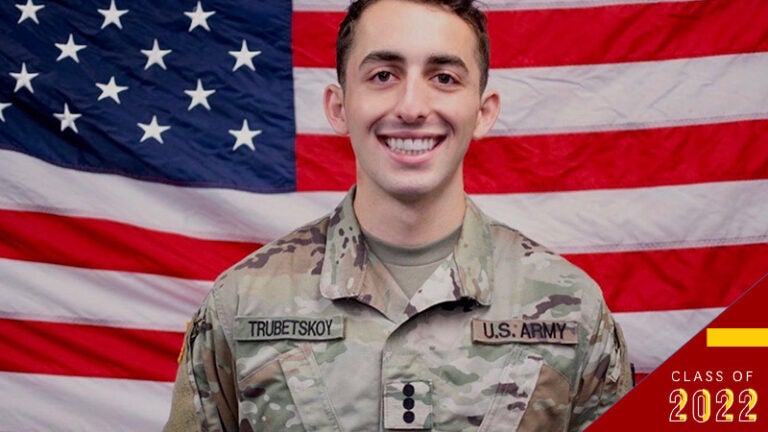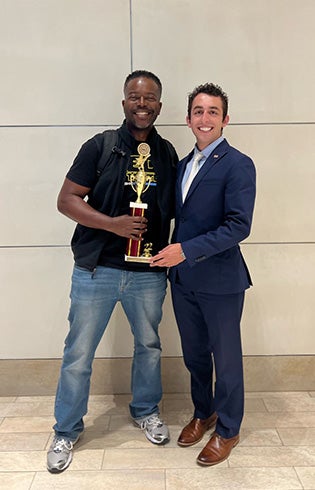
Russian immigrant Vadim Trubetskoy aims to give back to the country that gave him a home
When Vadim Trubetskoy was 5, he, his parents and his sister left Moscow to journey across a continent and an ocean to a country whose language they did not know and whose culture was largely unfamiliar.
“My parents did not know anyone in the United States, had no safety net or work visa, and knew only a couple of words of English. It was very much like a plunge into the unknown,” says Trubetskoy, who graduates May 13 with a bachelor’s degree in political science at the USC Dornsife College of Letters, Arts and Sciences.
After obtaining refugee status, Trubetskoy’s parents settled in Belmont, Massachusetts, outside of Boston. Now, as he prepares to graduate, he reflects on how he hopes to give back to the country that took him in, whether through the military, the legal system or public service.
“I would love the opportunity to hold public office at some point in life, but only if it’s an opportunity that’s presented to me by the community I’d be serving and if I can actually represent them in a meaningful way. It would be the honor of a lifetime,” he says.
Journey to an unfamiliar land

Vadim Trubetskoy (right) shares a winning moment with USC Trial Advocacy Program directory Olu Orange.
While unfamiliar with America, Trubetskoy’s parents did have connections to the West even before they left Russia. His father worked in sports merchandising and would regularly travel to the United Kingdom to work with the English Premier League, one of the largest soccer organizations in the world. Unfortunately, he had to give up his job when he moved.
Once they arrived in the U.S., his parents, both of whom lacked college degrees, worked wherever they could to make ends meet. Trubetskoy’s father bounced around transportation jobs while his mother began in retail and later became a travel agent. While he shies away from calling his family poor, Trubetskoy concedes that money was always a pressing concern.
Trubetskoy spent his first year of college at the University of Massachusetts, Amherst before transferring to USC Dornsife. He says he was thrilled to make the move to Los Angeles.
“Being from a low-income family, getting a full-ride scholarship to go to a school as prestigious as USC was definitely a determining factor. I hadn’t visited before I accepted, but I haven’t looked back since,” he says.
One of Trubetskoy’s turning points at USC Dornsife was his participation in the USC Trial Advocacy Program. He credits the program and its director, Adjunct Assistant Professor of Political Science Olu Orange, and assistant director, Hooman Kazemi, with showing him how the law could be used to protect the most marginalized members of society.
“The team has emphasized not just competing and winning at mock trial, but preparing people to be effective advocates for those in our society who need a voice the most. It teaches you the importance of using the law for good, whether through civil rights litigation or public defense work, to fight for the underserved,” he says. As a senior, Trubetskoy led the team to its first appearance in six years at the highest level of competition, the National Championship.
While at USC Dornsife, Trubetskoy also served as vice president of the California College Democrats. One of the major initiatives he undertook with the group was increasing young voter registration and turnout, particularly for the 2021 California gubernatorial recall campaign.
“It’s tough enough to get college-age kids to vote in a presidential election, let alone a special election in a ‘safe’ Democratic state like California. And we were immensely successful in boosting turnout, more so than a lot of people predicted,” he says.
Many paths to service
Trubetskoy’s immediate post-college plans involve fulfilling his service commitment in the Army ROTC Program. His decision to enter the program was partly inspired by his father and grandfather, both of whom served in the military, with his grandfather having fought for the Allies in World War II. To fulfill his service commitment after graduation, Trubetskoy hopes to enter military intelligence.
“I want to go into that field because my fluency in Russian is a key asset,” he explains. “In the future, I would like to apply it to protect U.S. national security interests.”
While Trubetskoy was in a pre-law program at USC Dornsife and plans to go to law school in the future, he is keeping his options open as to whether that path will lead to a career as an attorney or one in a related field, such as government office.
“I likely won’t practice law my entire life; I can see a blend of both law and politics, but whatever I do, I will always center it on some form of public service, giving back to the communities that gave me a home,” he says.
Trubetskoy says regardless of the specific career he chooses, he wants to make giving back the central tenet of his life’s work.
“The love that I have for my community and what unifies and brings us meaning — that has been my guiding principle in all I do. I want to leave the world a better place, and as good of a place as I possibly can,” he says.